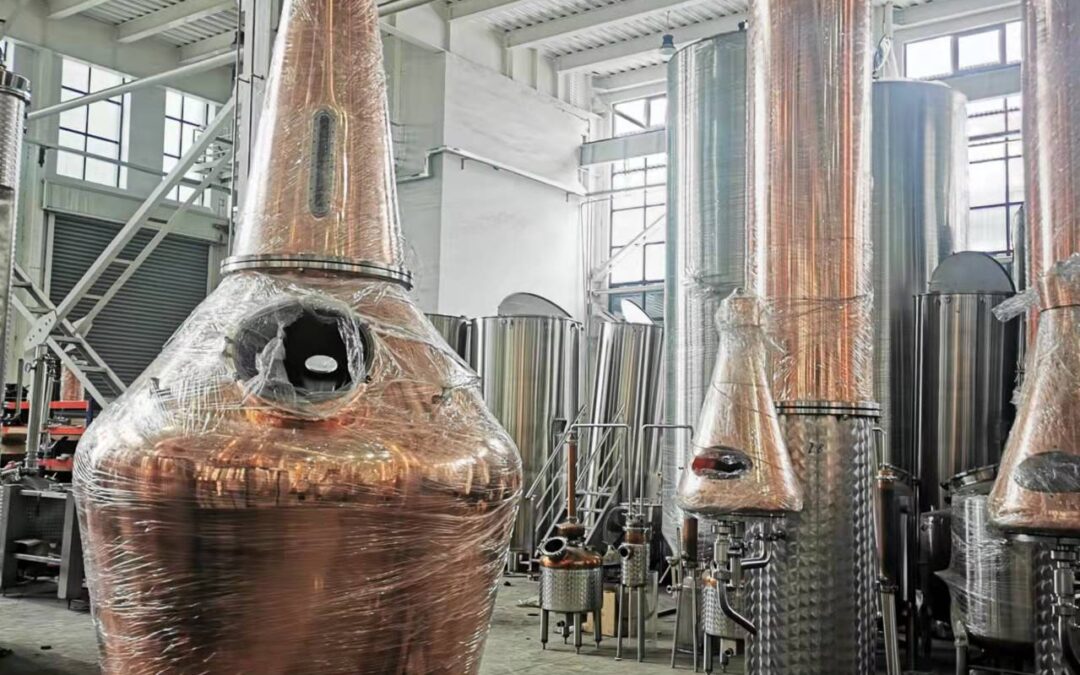Small batch whiskey is a term used to describe whiskey that is produced in smaller quantities than mass-produced whiskey. The history of small-batch whiskey can be traced back to the early days of American whiskey production.
In the 18th and 19th centuries, whiskey was typically made in small batches by farmers and distillers who used traditional techniques and ingredients. The quality and flavor of the whiskey varied depending on the skill of the distiller and the ingredients used. Small-batch whiskey was often produced in pot stills, which produced a rich and flavorful whiskey with a distinctive character.
During Prohibition in the United States, which lasted from 1920 to 1933, many small-batch distilleries were forced to shut down or go underground. When Prohibition was repealed, the whiskey industry was dominated by large corporations that produced mass-produced whiskey using modern techniques and equipment.
However, in the 1980s and 1990s, a new generation of whiskey enthusiasts began to rediscover the art of small-batch whiskey production. They sought out traditional distillers and techniques and began to produce small batches of high-quality whiskey with unique flavors and characteristics.
Today, small-batch whiskey is a popular and growing category of whiskey. It is produced by a variety of distilleries, both large and small, and is appreciated by whiskey enthusiasts for its quality, flavor, and the unique character of each batch.
What Makes A Great Small Batch Whiskey:
A great small-batch whiskey is a product of several factors, including the quality of the ingredients, the production process, the barrel aging, and the skill of the distiller.
One of the most critical factors in producing great small-batch whiskey is the quality of the ingredients. High-quality grains, pure water, and carefully selected yeast strains all contribute to the flavor, aroma, and complexity of the whiskey.
Another important factor is the production process. Small-batch whiskey is often made using traditional techniques, such as copper pot stills, which produce a more flavorful and complex spirit. Distillers may also use unique fermentation processes, such as sour mash, to create a distinctive flavor profile.
The barrel aging process is also crucial in producing a great small-batch whiskey. The type of barrel used, the length of aging, and the environment in which the whiskey is aged can all impact the final product’s flavor and aroma. Small-batch distillers may experiment with different barrel types, such as charred oak or sherry casks, to add complexity and depth to the whiskey.
Finally, the skill of the distiller is essential in producing great small-batch whiskey. Distillers must be knowledgeable about the ingredients, the production process, and the barrel aging to create a unique and high-quality product. They must also have a deep understanding of the distilling equipment and be able to monitor and adjust the process to achieve the desired flavor profile.
The Art Of Small Batch Whiskey:
The art of small-batch whiskey involves producing whiskey in small quantities using traditional techniques and carefully selected ingredients to create a unique and flavorful product.
Small-batch whiskey is typically made using pot stills, which are copper vessels used for distillation. These stills produce a more flavorful and complex whiskey than the column stills used for mass-produced whiskey.
The ingredients used in small-batch whiskey production are also carefully chosen. Small-batch distillers often use locally sourced grains, such as corn, rye, or barley, and may use heirloom or organic varieties to create a distinctive flavor profile. The water used in the whiskey-making process is also important and may be sourced from a particular spring or well to create a unique taste.
Small-batch whiskey is aged in oak barrels, which imparts flavor and color to the whiskey. Small batch distillers may use a variety of barrel types, such as new or charred oak, or may experiment with different barrel finishes, such as sherry or port casks, to add complexity to the whiskey.
Small-batch whiskey is often produced in limited quantities, with each batch carefully crafted and monitored by the distiller. This attention to detail and the use of traditional techniques and high-quality ingredients create a unique and flavorful whiskey that is appreciated by whiskey enthusiasts around the world.
The art of small-batch whiskey is about preserving the traditions of whiskey-making while experimenting with different ingredients and techniques to create a product that is both traditional and innovative.
Small Batch Whiskey Tasting Factors:
When tasting whiskey, there are several key factors to consider that can help you appreciate the spirit’s unique flavor and character. Here are some things to look for when tasting whiskey:
Color: Observe the color of the whiskey. Whiskey can range in color from light gold to deep amber. The color of the whiskey can indicate its age and the type of barrel it was aged in.
Aroma: Take a whiff of the whiskey and see if you can detect any distinct aromas. Some common aromas in whiskey include vanilla, caramel, oak, spices, and fruits. The aroma can give you an idea of the whiskey’s flavor profile.
Flavor: Take a small sip of the whiskey and let it sit on your tongue for a few seconds. Notice the different flavors you can detect. Some common flavors in whiskey include vanilla, honey, cinnamon, pepper, and smoke. Try to identify any specific flavors that stand out to you.
Body: Consider the whiskey’s body or texture. Is it light or heavy? Does it feel smooth or rough on your tongue? A whiskey’s body can indicate its age and the type of barrel it was aged in.
Finish: Notice the aftertaste or finish of the whiskey. Does the flavor linger for a while, or does it fade quickly? The finish can give you an idea of the whiskey’s complexity and overall quality.
Overall, a great small-batch whiskey is the result of the perfect combination of high-quality ingredients, traditional production techniques, skilled distilling, and careful barrel aging. It is a product of passion, dedication, and attention to detail, resulting in a whiskey with a unique and memorable taste that is sought after by whiskey connoisseurs around the world.

